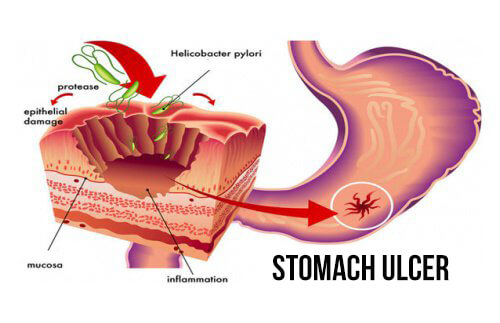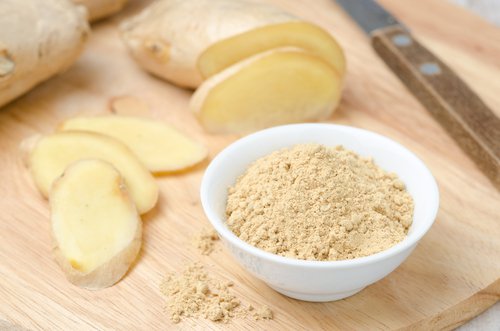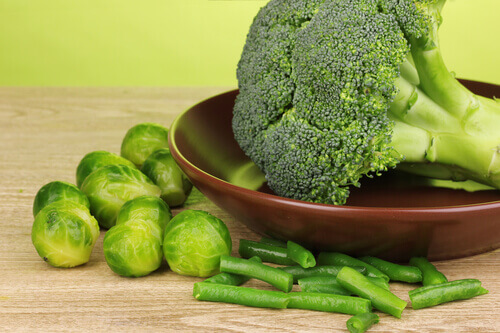How to Fight Helicobacter Pylori Bacteria


Reviewed and approved by the pedagogue in physical education and nutritionist Elisa Morales Lupayante
Helicobacter Pylori is known to be the cause of most stomach ulcers, gastritis, and other stomach infections. According to studies, they estimate that approximately two-thirds of the world’s population is infected with Helicobacter Pylori. This is because it is very easy to transmit, although sometimes it does not have any symptoms or problems. Fortunately, there are many ways to fight this bacteria and relieve the health problems it causes.
If you are suffering from a problem like stomach ulcers or gastritis because of Helicobacter Pylori Bacteria, we recommend the following natural remedies to fight it, eliminate it, and improve your health.
Essential Lemon Verbena Oil
Verbena oil is a plant that belongs to the Gramineae family. It is characterized by its carminative and digestive properties, as well as it’s effect on curing flatulence. According to various studies, essential lemon verbena oil can help with getting rid of Helicobacter Pylori Bacteria.
Propolis
Propolis is known to be a natural antibiotic and bactericide that has the ability to strengthen your defenses, fight infections, and treat problems like gastritis. This food, also known as bee resin, is a substance used to protect hives from infection. We assure you that propolis has the ability to eliminate Helicobacter Pylori Bacteria because of its amazing properties.
Ginger

This root is known worldwide for its many medicinal properties, especially for its effects and benefits on the digestive system. We recommend eating ginger to fight stomach acid, nausea, dizziness, stomach problems, ulcers, etc. Besides having a bactericidal ability, it could eradicate Helicobacter Pylori Bacteria.
Try this ginger recipe: Apple Cider Vinegar, Ginger, and Honey Digestive Tonic
White Cabbage
This food also has properties that help fight and get rid of Helicobacter Pylori. However, you have to eat it raw. Just like broccoli, it can cause flatulence, but you can try it in small amounts to see how you handle it. Try making a salad with finely diced cabbage leaves with a little bit of vinegar and lemon dressing. Another option is to make a fresh juice diluted in water.
Broccoli

This food can help fight Helicobacter Pylori Bacteria thanks to its high content in a phytonutrient called sulforaphane. According to various studies, it shows that frequent consumption of broccoli eliminates the bacteria.
The same component that eliminates Helicobacter Pylori is also related to the prevention of gastric cancer. Remember, that the consumption of broccoli can produce a lot of flatulence. However, you can prepare it cooked and mixed with cumin and ginger in order to reduce this annoying effect.
Turmeric
This Asian spice is full of medicinal properties that have been the focus of research in the last few years. It is used to treat dyspepsia, which is a disease that includes other digestive disorders like distension, stomach issues, nausea, or gas. Also, its properties help stimulate gastric juices which protect stomach mucus by prohibiting the actions of Helicobacter Pylori. However, experts recommend not overeating this.
Learn more about Tumeric: Lose Weight With These Delicious Turmeric Recipes
Other Elements that Can Help with this Treatment
- To fight this bacteria, it’s best to increase your consumption of foods with high antibacterial powers like in garlic, onion, coneflower, ginger, thyme, rosemary, mint, and honey.
- Other foods that can help are those that have probiotics. Although they don’t destroy the bacteria itself, they can inhibit it, as well as counteracting headaches, morning sickness, and dyspepsia.
- For people who don’t have stomach ulcers or gastritis, but do have the bacteria, you can drink lemon or pineapple juice or apple cider vinegar.
- A person affected by Helicobacter Pylori Bacteria should try to keep certain foods out of their diet like sugars, refined flours, and rice. Instead of this, you should increase your consumption of fruits, vegetables, and water.
- Lastly, you can make an alkaline drink to fight Helicobacter Pylori by mixing raw potatoes, celery, and carrots, which can be drunk before every meal.
All cited sources were thoroughly reviewed by our team to ensure their quality, reliability, currency, and validity. The bibliography of this article was considered reliable and of academic or scientific accuracy.
- Azizi-Soleiman, F., & Zamanian, M. (2020). Broccoli and Helicobacter Pylori: A Systematic Review. Complementary Medicine Journal, 10(1), 2-11. https://cmja.arakmu.ac.ir/browse.php?a_id=660&sid=1&slc_lang=en&html=1
- Baltas, N., Alpay, S., Cemre, T., & Kolayli, S. (2016). Effect of propolis in gastric disorders: inhibition studies on the growth of Helicobacter pylori and production of its urease. Journal of Enzyme Inhibition and Medical Chemistry, 31(2), 46-50. https://www.tandfonline.com/doi/full/10.1080/14756366.2016.1186023
- Boyanova, L., Ilieva, J., Gergova, G., Vladimirov, B., Nikolov, R., & Mitov, I. (2015). Honey and green/black tea consumption may reduce the risk of Helicobacter pylori infection. Diagnostic Microbiology and Infectious Disease, 82(1), 85-86. https://www.sciencedirect.com/science/article/abs/pii/S0732889315000668
- de Brito, B. B., da Silva, F. A. F., Soares, A. S., Pereira, V. A., Santos, M. L. C., Sampaio, M. M., Neves, P. H. M., de Melo, F. F. (2019). Pathogenesis and clinical management of Helicobacter pylori gastric infection. World Journal of Gastroenterology, 25(37). https://www.ncbi.nlm.nih.gov/pmc/articles/PMC6785516/
- Ebrahimzadeh Attari, V., Somi, M. H., Asghari Jafarabadi, M., Ostadrahimi, A., Moaddab, S. Y., & Lotfi, N. (2019). The Gastro-protective Effect of Ginger (Zingiber officinale Roscoe) in Helicobacter pylori Positive Functional Dyspepsia. Advanced Pharmaceutical Bulletin, 9(2), 321-324. https://www.ncbi.nlm.nih.gov/pmc/articles/PMC6664109/
- Fahey, J., Stephenson, K. K., Wallace, A. J. (2015). Dietary amelioration of Helicobacter infection. Nutrition Research, 35(6), 461-73. https://www.ncbi.nlm.nih.gov/pmc/articles/PMC4465045/
- Fundación Española del Aparato Digestivo. (25 de octubre de 2024). Recomendaciones nutricionales para pacientes con infección por Helicobacter pylori. https://www.saludigestivo.es/mes-saludigestivo/helicobacter-pylori/helicobacter-pylori/#recomendaciones-nutricionales
- Ji, J., & Yang, H. (2020). Using probiotics as supplementation for Helicobacter pylori antibiotic therapy. International Journal of Molecular Sciences, 21(3), 1136. https://www.mdpi.com/1422-0067/21/3/1136
- Korona-Glowniak, I., Glowniak-Lipa, A., Ludwiczuk, A., Baj, T., & Malm, A. (2020). The In Vitro Activity of Essential Oils against Helicobacter Pylori Growth and Urease Activity. Molecules, 25(3), 586. https://www.ncbi.nlm.nih.gov/pmc/articles/PMC7037374/
- Kwiecien, S., Magierowski, M., Majka, J., Ptak-Belowska, A., Wojcik, D., Sliwowski, Z., Magierowska, K., & Brzozowski, T. (2019). Curcumin: A Potent Protectant against Esophageal and Gastric Disorders. International Journal of Molecular Sciences, 20(6), 1477. https://www.mdpi.com/1422-0067/20/6/1477
- Malfertheiner, P., Camargo, M. C., El-Omar, E., Liou, J. M., Peek, R., Schulz, C., Smith, S. I., & Suerbaum, S. (2023). Helicobacter pylori infection. Nature Reviews Disease Primers, 9(1), 19. https://www.nature.com/articles/s41572-023-00431-8
- Masadeh, M. M., Alkofahi, A. S., Alzoubi, K. H., Tumah, H. N., & Bani-Hani, K. (2014). Anti-Helicobactor pylori activity of some Jordanian medicinal plants. Pharmaceutical Biology, 52(5), 566-569. https://www.tandfonline.com/doi/full/10.3109/13880209.2013.853811
- Megha, R., Farooq, U., & Lopez, P. (2023, 16 de abril). Stress-induced gastritis. In StatPearls [Internet]. StatPearls Publishing. https://www.ncbi.nlm.nih.gov/books/NBK499926/
- Parikh, N., & Ahlawat, R. (2023). Helicobacter Pylori. StatPearls. Consultado el 8 de noviembre de 2024. https://www.ncbi.nlm.nih.gov/books/NBK534233/
- Perales-Flores, J. D., Verde-Star, M. J., Viveros Valdéz, J. E., Barrón-González, M. P., Garza-Padrón, R. A., Aguirre-Arzola, V. E., & Rodríguez, R. G. (2023). Actividad antioxidante, tóxica y antimicrobiana de Rosmarinus officinalis, Ruta graveolens y Juglans regia contra Helicobacter pylori. Biotecnia, 25(1), 88-93. https://www.scielo.org.mx/scielo.php?pid=S1665-14562023000100012&script=sci_arttext
- Quevedo, A. F. (2017). Tratamiento de Helicobacter pylori con aceites esenciales quimiotipados. Ponencia en el 9º Congreso de Fitoterapia de SEFIT – 9ª Jornada Farmacéutica de la Isla del Rey. https://www.sefit.es/tratamiento-helicobacter-pylori-aceites-esenciales-quimiotipados/
- Reygaert, W. C. (2018). Green Tea Catechins: Their Use in Treating and Preventing Infectious Diseases. BioMed Research International, 9105261. https://www.hindawi.com/journals/bmri/2018/9105261/
- Zardast, M., Namakin, K., & Esmaelian Kaho, J., & Hashemi, S. S. (2016). Assessment of antibacterial effect of garlic in patients infected with Helicobacter pylori using urease breath test. Avicenna Journal of Phytomedicine, 6(5), 495-501. https://www.ncbi.nlm.nih.gov/pmc/articles/PMC5052411/
This text is provided for informational purposes only and does not replace consultation with a professional. If in doubt, consult your specialist.








